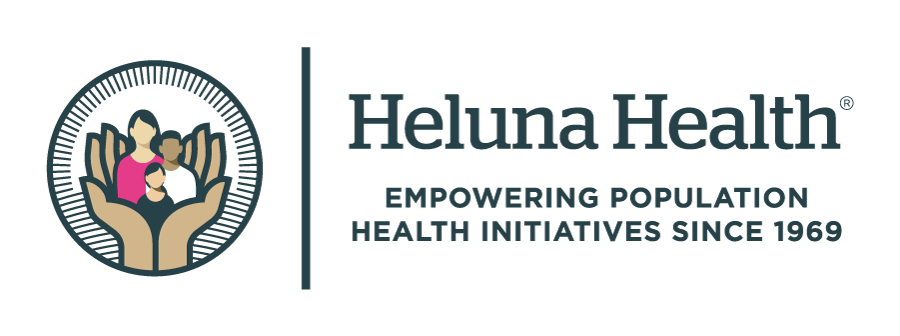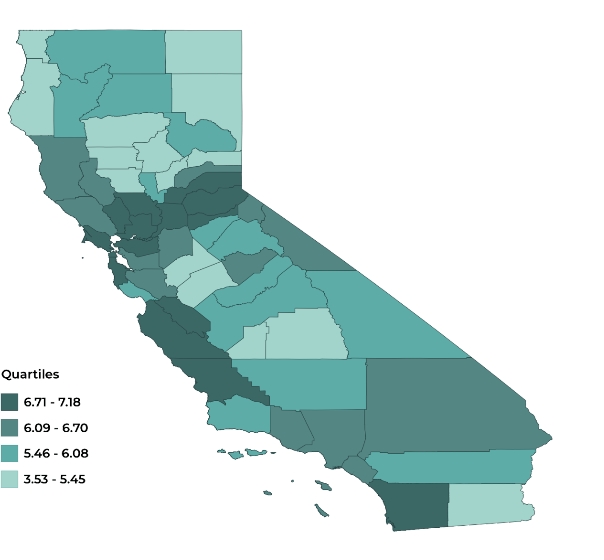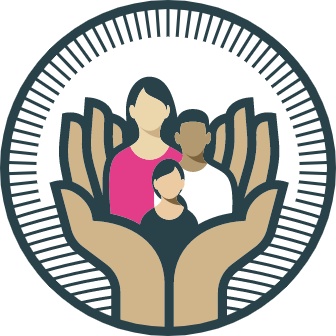Health Equity
Impact Report
2022-2023
Health Equity
Impact Report
2022-2023
Welcome
We are excited to share with you Heluna Health’s annual impact report, featuring stories on how we are advancing health equity and preparedness in the communities that we and our partners serve. Whether you are a longtime friend or are just learning about us, we hope that this report will inspire you to continue or join the effort to mitigate health disparities in California and beyond.
In pursuing Heluna Health’s mission to advance population health, our team is directly involved in supporting and/or implementing more than 500 initiatives a year. These encompass a wide range of health-related challenges, including disparities in maternal and infant health, childhood obesity, gang intervention, homelessness, and much more. Common among the interventions undertaken is an evidence base, data analysis, and research.
I hope you will be inspired by the stories in this impact report. The problems we face in population health are daunting, but they are not intractable. There is much more that we need to do to better address the social determinants of health that contribute to health inequities in communities across California and beyond. Together we can and will make great progress in improving the lives of those living within our communities; I look forward to working with you to further our success.
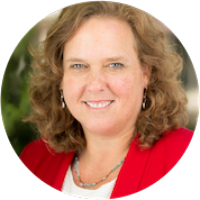
Blayne Cutler, MD, PhD
President and
Chief Executive Officer

Blayne Cutler, MD, PhD
President and
Chief Executive Officer
We are excited to share with you Heluna Health’s annual impact report, featuring stories on how we are advancing health equity and preparedness in the communities that we and our partners serve. Whether you are a longtime friend or are just learning about us, we hope that this report will inspire you to continue or join the effort to mitigate health disparities in California and beyond.
In pursuing Heluna Health’s mission to advance population health, our team is directly involved in supporting and/or implementing more than 500 initiatives a year. These encompass a wide range of health-related challenges, including disparities in maternal and infant health, childhood obesity, gang intervention, homelessness, and much more. Common among the interventions undertaken is an evidence base, data analysis, and research.
I hope you will be inspired by the stories in this impact report. The problems we face in population health are daunting, but they are not intractable. There is much more that we need to do to better address the social determinants of health that contribute to health inequities in communities across California and beyond. Together we can and will make great progress in improving the lives of those living within our communities; I look forward to working with you to further our success.
OUR MISSION
Heluna Health enhances the health, wellness,
and resilience of every community we serve
OUR Vision
Healthy, strong
communities for all
OUR Values
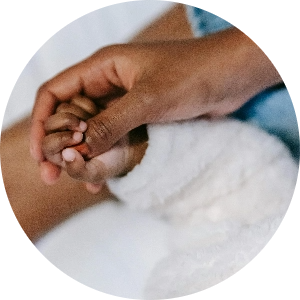
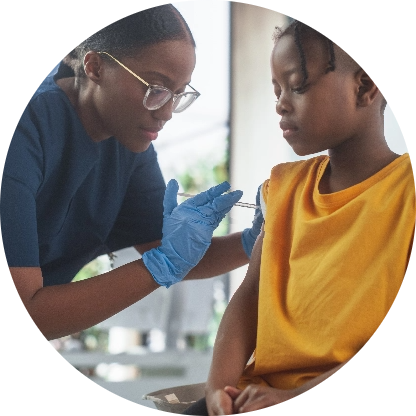

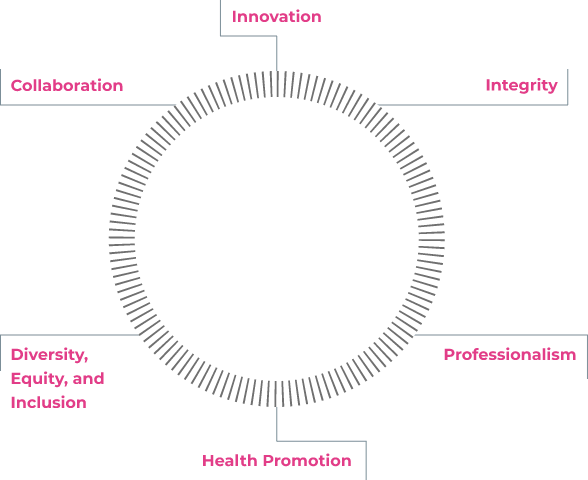
HELUNA HEALTH OVERVIEW
Heluna Health provides innovative services and evidence-based programs that improve the overall health and well-being of our communities.
OUR Values
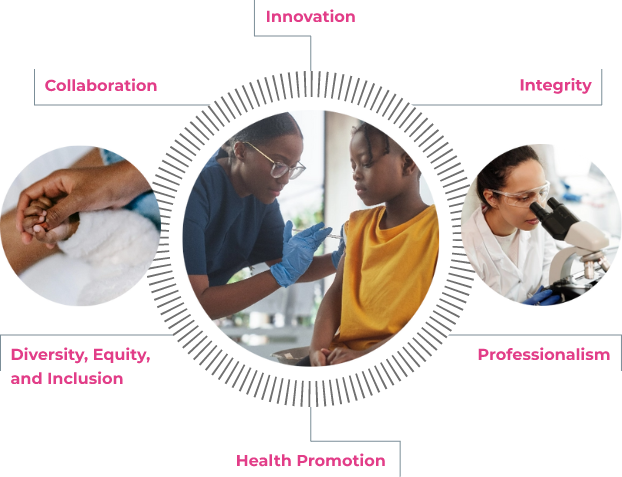
HELUNA HEALTH OVERVIEW
Heluna Health provides innovative services and evidence-based programs that improve the overall health and well-being of our communities.

Heluna Health works with and supports a wide range of population health partners, providing administrative support so they can increase their capacity and raise their visibility so they can better achieve their goals.

Working directly in local communities, we implement evidence-based, innovative population health programs.

Through training, internships, and professional development, Heluna Health is leveraging decades of population health expertise to inspire, advance, and activate mission-driven professionals to improve health outcomes in the communities where they serve.

Our expert staff conducts research and data analysis, developing partnerships that generate valuable insights such as data briefs and national survey reports.

Our organization has access to a diverse network of public health professionals and academic experts who can assist in sharing their expertise.

Countering Diabetes
with the Aid of a Heluna Health Dietitian
In 2020, feeling depressed and tired, Martha Rojas went to Angeles Community Health Center, a federally qualified health center (FQHC) serving low-income people in Los Angeles. With high blood sugar levels and weighing nearly 300 pounds, she was diagnosed with diabetes.
Countering Diabetes
with the Aid of a Heluna Health Dietitian
In 2020, feeling depressed and tired, Martha Rojas went to Angeles Community Health Center, a federally qualified health center (FQHC) serving low-income people in Los Angeles. With high blood sugar levels and weighing nearly 300 pounds, she was diagnosed with diabetes…
Spotlight Stories
Learn more about some of our partners and direct service programs working to improve health outcomes in our communities.
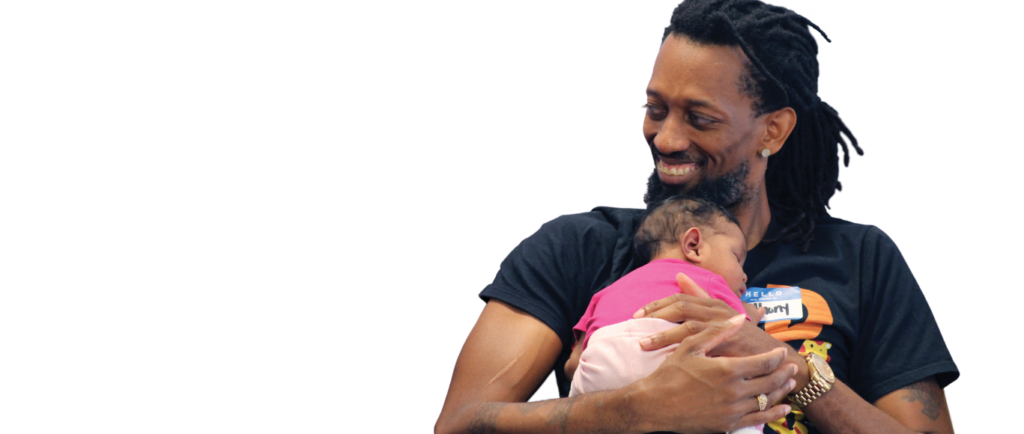
Spotlight Stories
Learn more about some of our partners and direct service programs working to improve health outcomes in our communities.

Heluna Health’s Smart Bet on Research
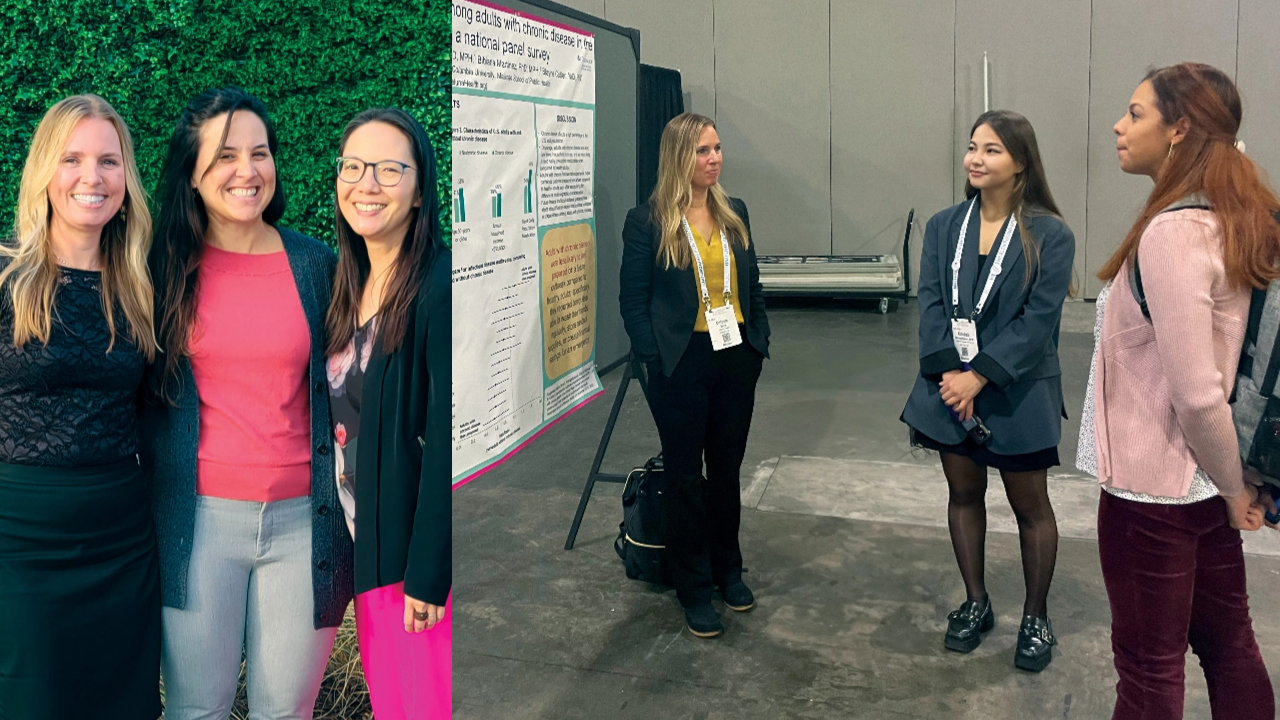
Heluna Health has been gathering and analyzing data on the effectiveness of its programs for decades, so it made sense when Heluna Health’s CEO, Dr. Blayne Cutler, hired Dr. Jo Kay Ghosh as the nonprofit’s first Director of Research and Evaluation in 2021. With 20 years of experience in population health or related research, Ghosh was charged with building a team to expand research work across the organization. Its studies in population health could lead to insights that would help communities, and the group would also support Heluna Health partners if they needed program assessment, expanding the types of services Heluna Health could offer clients. A research and evaluation team extends Heluna Health’s thought leadership in population health and allows the organization to expand into new and vital areas of investigation, such as climate and environmental health.
In just over two years, Ghosh and her team of investigators have already authored peer-reviewed research papers in health journals and presented their work at scientific conferences. Ghosh developed a series of data briefs as one way to highlight the research that her team conducts. She describes these data briefs as “a deep dive into a piece of population health data that would be of value to a public audience.” The first data brief, released in early 2023, presented the results of a national research study showing regional differences in access to social safety net services that could affect community response to and recovery from communicable disease outbreaks. The second data brief, released in August 2023, concerned the impacts of wildfires and what people can do to protect their health. Ghosh and her team focused on the noxious smoke from wildfires in 12 Western states. Results of a representative panel survey showed that 40% of all adult residents in these states reported being impacted by wildfire smoke in the past three years. Nearly half also reported not having a high level of knowledge about what can be done to prepare for the effects of wildfire smoke. Heluna Health also provided a companion resource document to give people practical information on how to prepare.
“The chance of being so directly impacted that you need to evacuate because of a wildfire is pretty rare,” Ghosh says. “But the chances of being impacted by smoke from wildfires is really high. More and more, we’re recognizing that these types of environmental health threats are going to become increasingly common as climate change makes for longer periods of drought.”
As for the evaluation half of the team’s work, Heluna Health is partnering with the Los Angeles County Department of Public Health on a federal government initiative called “Ending the HIV Epidemic (EHE),” aiming to end HIV in the U.S. by 2030. Ghosh’s team is evaluating how feasible it is for clinics and other community organizations that serve people with HIV to implement interventions with the level of funding that they have received. Another project involves an assessment of the birth and professional skills training program for doulas developed and offered by SisterWeb San Francisco Community Doula Network, a partner of Heluna Health. For that project, Heluna Health received a $100,000 grant from Unihealth Foundation to support the evaluation.
“The purpose of a program evaluation is to identify what works and what doesn’t work,” Ghosh says. “Some assessments focus on how much a program costs in relation to its benefits. Some look at how many people are helped and how a program can be more effective so it can reach more people. Others measure health outcomes.”
“There will be increasing need for population health research as problems become even more complex,” says Dr. Cutler. “Climate change, for example, introduces many new community health challenges, creating an opportunity for Heluna Health to lead in offering research insights and resources to help communities better understand, prepare for, and respond to these shifting realities.”
“We want to reach a range of audiences so that pertinent information resulting from our research can be put to use,” Ghosh says. “In the two and a half years we’ve been here, we’ve created a brand new research and evaluation group. We’re still refining it, but we have been able to produce some good work and we are building capacity to do more.”

WILDFIRE SMOKE IMPACTS IN THE WEST*
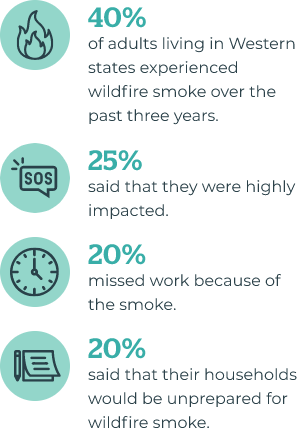
*Wildfire Smoke Impacts in Western States and Gaps in Household Preparedness, Heluna Health Insights: Data Brief, Vol. 1, Issue 2, August 2023.
“My charge is to raise visibility about the work that Heluna Health does as a whole that may be complementary to what our program partners do,” Ghosh says. “We can also support clients by providing evaluation services as part of a package of services.”

Jo Kay Ghosh, PhD
Director of Research and Evaluation, Heluna Health
Leading the Nation in WIC Research
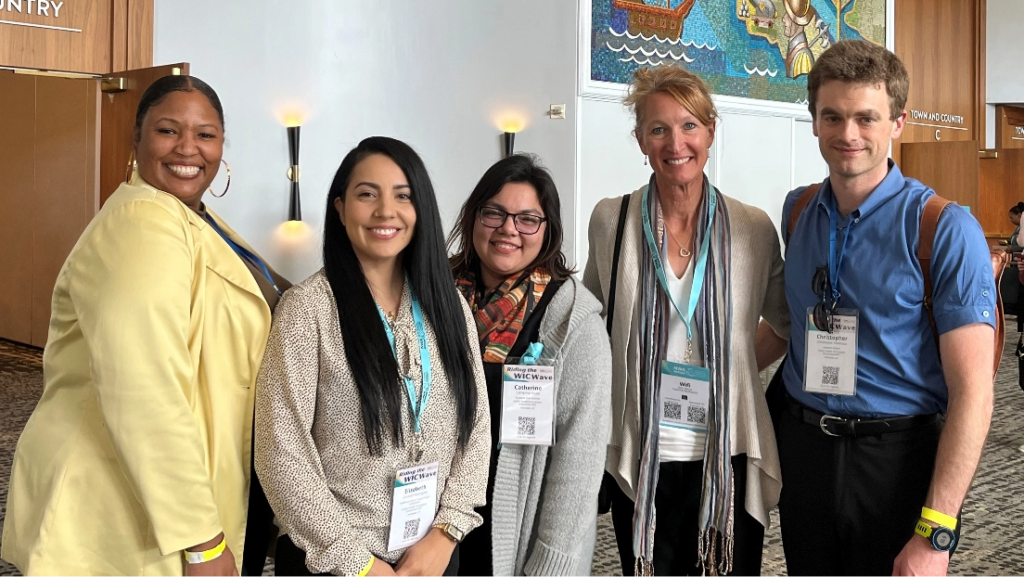
Heluna Health’s Women, Infants, and Children (PHFE WIC) program is not only the largest WIC agency in the U.S., but it’s also the only one with a research department. Our researchers are often the first to uncover when nutritional programs are working, and also when improvements can be made.

Welcome to CinnaMoms Crenshaw in Inner-City Los Angeles
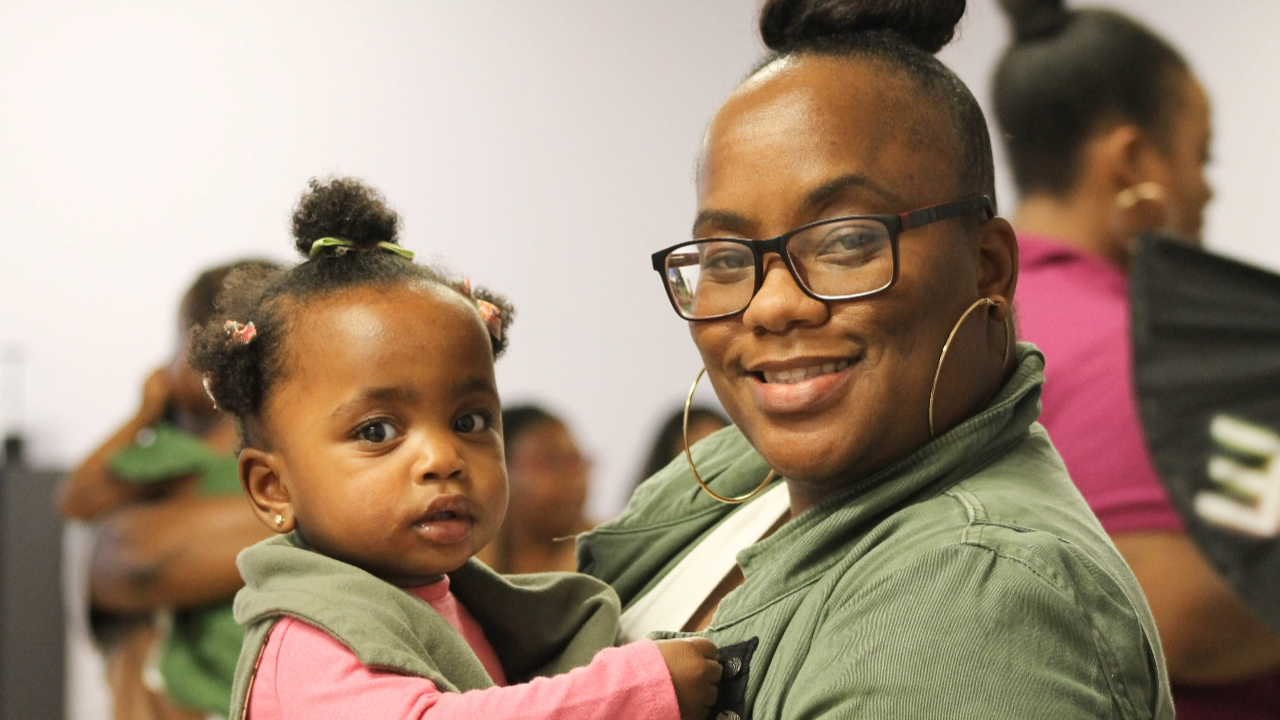
In the Crenshaw District of South Central Los Angeles, within the Obama Women, Infants, and Children (PHFE WIC) program office, is a well-appointed suite decorated with purple couches and lounge chairs, pastel-colored walls, potted plants, a children’s play corner, and a kitchen area. When entering the space, visitors should feel at home. Opened in August 2023, this is the first dedicated center for CinnaMoms, the Heluna Health program focused on serving Black/African American women.
“This space is about rest, nest, and connect,” says Dr. Toncé Jackson, co-founder and Director of CinnaMoms and Senior Health Equity Manager for Heluna Health’s WIC program. “We wanted to create a space so that if women want to rest, they can do so here. Nesting refers to preparing for birth—preparing for the next chapter in a pregnant woman’s life.” As for connecting, Jackson says, “We want families from the Crenshaw District to connect with each other and to the larger maternal health system” when visiting the CinnaMoms center.
CinnaMoms Crenshaw was created with funds from Heluna Health. Eventually, Jackson says, there could be a dedicated CinnaMoms space in every WIC location in Los Angeles neighborhoods with a sizable Black population. But Jackson would also like CinnaMoms to spread beyond the L.A. region, even to other states.
Disparities in health outcomes show that there is a clear need to help Black mothers through their pregnancies and in the immediate years after they have given birth. Black women are three times more likely to die from a pregnancy-related cause than white women, and are also more likely to be hospitalized for postpartum depression than women from other racial or ethnic groups. And while the advantages of breastfeeding are widely known, Black women have the lowest rates of starting and continuing breastfeeding compared to other racial and ethnic groups in the U.S. For the women it serves, CinnaMoms provides the resources and information these women need for healthy birth and postpartum experiences.
Jackson got the idea for CinnaMoms in 2015, when she was leading breastfeeding education in Heluna Health’s WIC headquarters. “I noticed that at our WIC, Black women were breastfeeding at a lower rate than Latinos and whites,” Jackson says. While pursuing a master’s in public health, she learned that the low rate of breastfeeding among Black women was not due to a lack of interest, but to a lack of access to lactation consultants from communities of color, the historical marketing of formula in the Black community, and other social and economic factors. Studies showed that having access to peer counselors or lactation consultants of color or support groups would help improve breastfeeding outcomes for Black women. “I said, ‘We can do something about this.’”
CinnaMoms launched in 2015, with meetings held every other month in the five local WIC centers near large Black populations. Discussions were not only about breastfeeding, but about maternal health overall, including nutrition and the importance of doulas and midwives. In 2021, CinnaMoms received a grant from the U.S. Department of Agriculture, enabling Jackson to hire three peer staff members, to conduct outreach, and to survey CinnaMoms participants. Positive survey results helped convince Heluna Health to invest in a dedicated CinnaMoms space.
During the COVID-19 pandemic, when Heluna Health’s WIC transitioned to remote services, CinnaMoms began holding its support circles through Zoom. While virtual meetings are easy to attend, they cannot replace the intimacy of in-person interactions, which informed CinnaMoms’s decision to open the Crenshaw space.
For Jackson, opening up more CinnaMoms spaces is one part of her effort for empowerment. “I want to create an ambassador program, so we can show other WIC agencies how to replicate CinnaMoms,” she says. “This feels good,” Jackson says. “It reminds me of the power of creativity, the power of support from our leadership, the power of having a vision and seeing it through. We’ve been able to create a community. Hearing our families say, ‘This is for us,’ was a vision realized.”

BREASTFEEDING INITIATION IN THE U.S.
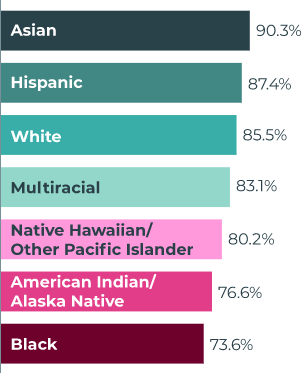
Chiang, et al., Racial and Ethnic Disparities in Breastfeeding Initiation—United States, 2019. MMWR Morb Mortal Wkly Rep 2021;70;769-774.
“My third and fourth born were exclusively breastfed. The knowledge and the support I gained from CinnaMoms and WIC kept me going.”
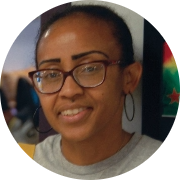
Nicole Craig
CinnaMoms participant

Partnering for Health Equity in the San Gabriel Valley
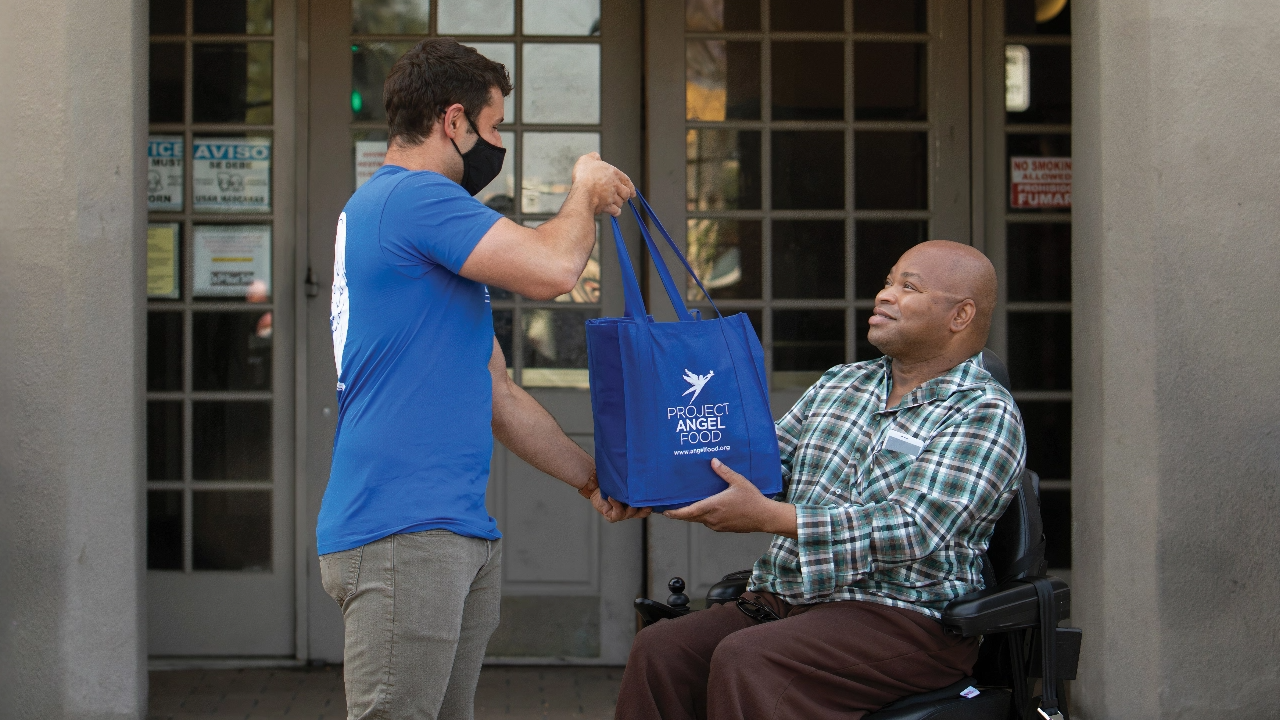
In 2007, Carolin Eng was volunteering at a community center’s cancer support department in the San Gabriel Valley near Los Angeles and noticed a young man from China with late-stage colon cancer. An oncology nurse with a Master’s in Public Health, she later saw him at an outing for cancer patients holding hands with his wife and looking hopeless, and wondered if he had health insurance and if his condition wouldn’t have been so dire had he had access to health care early on.
Inspired to act by this patient, Eng says, “I went to the director of the center and told him that I wanted to start a clinic for uninsured new immigrants.” Many meetings followed, including with members of a group of health administrators from the area. They gave her advice and other assistance to help her launch the clinic, which she named Herald Christian Health Center. Starting with two exam rooms and two dental chairs in the city of San Gabriel, Herald Christian has spread to five facilities. The group who helped her are part of the Health Consortium of Greater San Gabriel Valley (Health Consortium), a partner program of Heluna Health.
The Health Consortium was established in 2000 to address the fragmented network of services in the San Gabriel Valley (SGV) that existed then, as well as the lack of access to primary and specialty care services for the area’s large uninsured and under-insured population. The Health Consortium has more than 150 participants, including local federally qualified health centers (FQHCs), nonprofit hospitals, behavioral healthcare organizations, health plans, city and county agencies, social health organizations, academic institutions, and many others.
Most health coalitions around the country serve as information hubs, informing members about local health-related developments. The Health Consortium of Greater San Gabriel Valley does that too, through regular meetings, webinars, newsletters, and summits, covering topics such as suicide awareness and health equity.
The Health Consortium stands out because its participants are highly collaborative. During the COVID-19 pandemic, for example, when Herald Christian Health Center was offering vaccinations and testing in several locations, Eng called Koy Parada, a nursing professor at Azusa Pacific University (APU), and a fellow member of the Health Consortium’s Steering Committee. Eng asked her if any of her students were available to help. “The students at APU needed to fulfill a public health rotation and we didn’t have extra funds to hire staff to administer tests and vaccines,” Eng says. “They gave me 15 to 20 students each day. We were able to administer 50,000 vaccines over two years. We couldn’t have done that without them.” Says Parada, “It was a time of need, we all came together, and we served. There’s no better way to educate my students.”
Under the leadership of Director Deborah Silver, the Health Consortium of Greater San Gabriel Valley has also developed projects in collaboration with its clinic and hospital partners, offering retinal telemedicine, colorectal cancer screening, and teledermatology programs for low-income adults. In 2019, the Health Consortium and its SGV Hospital Collaborative—consisting of six area nonprofit hospitals—initiated a pilot program with Union Station Homeless Services to provide housing and health care linkages to unhoused individuals discharged from five of the hospitals. A recent program, Food for All San Gabriel Valley, with lead funding from UniHealth Foundation, links hospital patients screened as food insecure with emergency food resources and medically tailored meals (MTMs), so that when they are discharged, they can continue receiving nutritious meals.
In April 2024, the Health Consortium will host the 2024 SGV Health Summit to highlight local Diversity, Equity, and Inclusion initiatives. The Summit will include a Healthcare Workforce Forum to foster linkages between healthcare organizations facing significant staffing challenges and local academic institutions training students in various health professions. “The Health Consortium is pulling together resources, leveraging strengths, and helping each other in places where we are weak,” says Silver. “We act and find solutions and engage.”

HEALTH IMPACT IN THE SGV
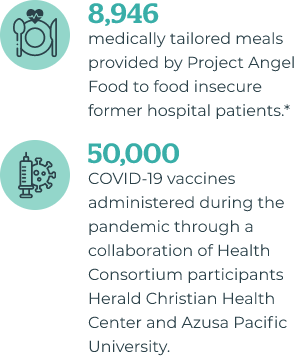
*June 2022 – Oct. 2023
“All of us in the Health Consortium are committed to serving the most vulnerable. Achieving health equity is hand in glove. In healthcare, it doesn’t make any sense to be in a silo. We all have strengths that we can collectively give to solve a problem. There should never be competition in who is serving the most vulnerable.”
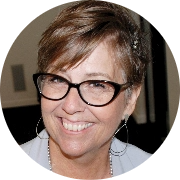
Nancy Clifton-Hawkins
Director, Community Benefit, City of Hope
FEATURED
Getting Ready for Our Next Emergency with the Community Outbreak Preparedness Index

Imagine a digital map of the state you live in. You can zoom in on your county and instantly see how it fares in terms of hospital surge capacity, access to healthy housing, and many other measures of outbreak preparedness.
You can also tell how your county compares to others. While not designed to help people choose the safest places to live, such a tool could help government officials better understand the vulnerable areas in their communities and use the data to make improvements. Far from a pipe dream, such a resource was launched by Heluna Health in November 2023 to help people easily gauge the preparedness of U.S. counties—starting with the 58 counties in California. Called the Community Outbreak Preparedness Index (COPI), it is the first such comprehensive assessment tool for future outbreak preparedness.
COPI INTERACTIVE MAP
“Heluna Health has been engaged in outbreak response work for years,” says Heluna Health President and CEO Dr. Blayne Cutler. “We know how important it is for communities to be prepared for outbreaks, and local agencies are usually the first to be called upon to respond. COVID-19 reinforced that. Much of our work relies on statistical information, and we saw an opportunity to leverage a wide range of data to provide a detailed picture of county-level preparedness. Hopefully this information will help public agencies before the next crisis—not afterward.”
COPI is part of Heluna Health Insights, which includes research and evaluation services and tools. The interactive tools and resources developed for this outbreak preparedness project provide the public with a user-friendly way to explore some of the data.
For the COPI project, Heluna Health Research and Evaluation Director Dr. Jo Kay Ghosh and her team mined a diverse range of data for all California counties, building an index that reflects the many dimensions of outbreak preparedness. “We’re summarizing a lot of data, so it’s more easily understood without having to dive into the details of all these different data points,” she says. “It’s a way for counties to see how they’re doing in relation to each other. It will make them aware of some areas where there may be some gaps and help them plan for those more proactively. They may see that their surge capacity is limited. For most counties, it is limited, because they don’t have extra workers sitting around ready to jump into action. That’s why they might hire organizations like Heluna Health, because we have a track record of helping with surge capacity, for example.”
California was an ideal place to start, since the state has a strong county government structure in which every county, even the least populous, has its own public health department. Three cities within California also have their own public health departments. In many other states, there is a combination of big city health departments, multi-county health departments, and one state health department covering rural areas, making it more complicated to compare county-level preparedness.
“There isn’t a lot of research on local-level preparedness for outbreaks,” Ghosh says. “Most research on a local level looks at single diseases, like a county’s vulnerability for influenza or HPV or COVID. But you can’t predict when the next pandemic will happen or what pathogen it might be. For any outbreak, you need a whole infrastructure that will support disease surveillance, health management, medical response, and effective implementation of medical countermeasures, like vaccination and treatment.”
Following California, Ghosh and her team plan to include more states. “The hope is that COPI will help identify gaps that can be addressed,” she says. “The best outcome is that COPI will enable people to advocate for the resources they need as an investment for the future.”
Are you ready for our next emergency?
COPI TAKEAWAYS
In hospital medical surge capacity, the state’s larger counties perform well on four key clinical healthcare indicators that impact preparedness: hospital staff, supplies, space, and systems.
The widespread lack of safe, affordable housing has profound implications for outbreak preparedness.
Social capital measures—which assess the strength of community networks—are more robust in less populous counties, nearly across the board.
The most populous counties have above-average preventable hospitalizations, straining capacity.
Smaller, typically rural counties struggle with food insecurity and pediatric vaccination—particularly immunizations required for children to attend schools.
Many eligible Californians in more populous counties are not fully enrolling in the CalFresh program to receive SNAP food benefits. Research has shown that food insecurity can increase vulnerability to infection and many other adverse health outcomes.
Almost every California county could do more to adequately staff nursing homes, reducing communicable disease risks to vulnerable populations of older Californians.
Behind COPI
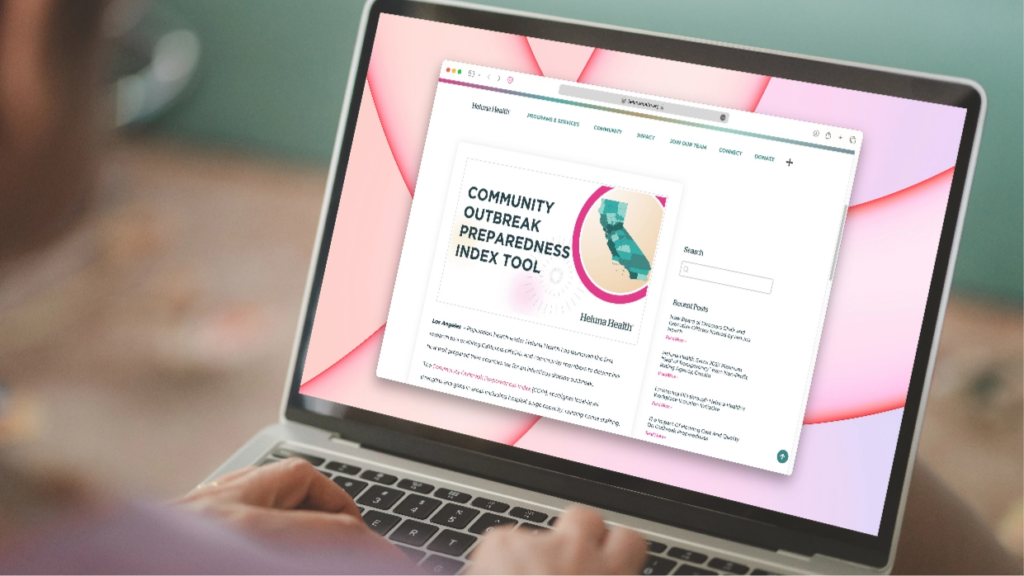
Producing an assessment tool such as COPI, which breaks down the preparedness of the 58 (and very diverse) counties in California, is a complex endeavor. To help explain the method behind COPI, the Research and Evaluation team produced a detailed report that explains it all.
Community
Heluna Health is strong because of its diverse and dedicated community.
The Heluna Health community starts with our program participants and those whom we serve—the thousands of people from vulnerable circumstances who benefit from our work. It includes our clients, with whom we partner to effect positive change, and our dedicated staff who focus on helping others in communities throughout California and beyond. And our community includes and depends on many generous individuals, including our Board members and other leaders, corporations, foundations, government agencies, and others that provide the support that helps us advance population health and preparedness.
New Board Leadership
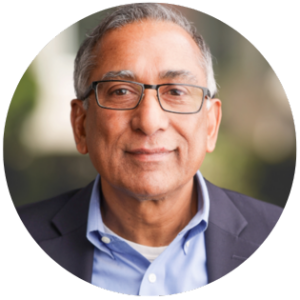
Santosh Vetticaden, MD, PhD, MBA
Chair, Heluna Health
Board of Directors
Biotech Entrepreneur/ Co-founder, Visgenx Inc.
“Having served on the Heluna Health Board of Directors for more than eight years, I am honored to lead this incredible organization as the Board Chair. Heluna Health has been at the forefront of transformative changes not only in overarching aspects of population health, but also at the grass roots level, impacting lives on a day-to-day basis in the communities we serve. I don’t know of any other organization that has been able to make such a difference helping vulnerable people achieve significantly better health outcomes.
To help us in these important efforts, we continue to add to the breadth and expertise on the Board, and in 2023, we welcomed three new Board members—Jennifer Covich Bordenick, Alessandro Lazzarini, and Virginia Pryor, and named two new officers—Carladenise Edwards as Vice Chair, and Nicole J. Macarchuk as Secretary. I am delighted to work with them and our other Board members in achieving our goals.
On behalf of the Heluna Health Board of Directors and Executive Management Team, I thank our supporters who have given us the resources to change the trajectory of people’s health and lives, and invite all of you to help us continue our work building healthy, strong communities for all.”
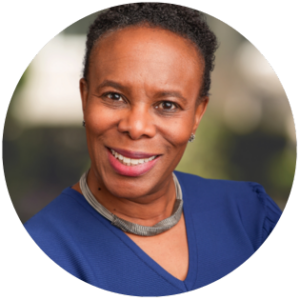
Carladenise Edwards, PhD
Vice Chair, Heluna Health
Board of Directors
Chief Administrative Officer, Miami-Dade County
“It has been my pleasure to serve on the Heluna Health Board of Directors for over six years. I continue to be impressed by the organization’s professionals who have dedicated their lives to serving the community through their support of programs that make a measurable impact on health equity.
Heluna Health and many of the programs we support are designed to benefit the most vulnerable and I’m so proud to serve as the Vice Chair of the Board. The investments we must make to achieve better health for all are significant, but they are not insurmountable, and by working together, we can inspire change, leading to a better future.”
At Heluna Health, we serve a wide range of partners working in local communities and lead our own programs that provide proven population health interventions. In the following list, we recognize the partners whom we worked with during the period July 1, 2022 – June 30, 2023.

- 4BoneHealth
- Action on Smoking and Health (ASH)
- American Dental Therapy Association
- California Health and Human Services Agency
- California Department of Public Health (CDPH)
- CDPH Center for Family Health
- CDPH Genetic Disease Screening Program
- CDPH Women, Infants, and Children Program
- CDPH Center for Healthy Communities
- CDPH Center for Infectious Diseases
- CDPH Division of Communicable Disease Control (DCDC)
- CDPH California Emerging Infections Program (CEIP)
- CDPH California STD/HIV Prevention Training Center (CAPTC)
- CDPH Infant Botulism Treatment and Prevention Program
- CDPH Infectious Diseases Branch
- CDPH Microbial Diseases Laboratory (MDL)
- CDPH Vector-Borne Disease Section (VBDS)
- CDPH Viral and Rickettsial Disease Laboratory (VRDL)
- CDPH Division of Chronic Disease and Injury Control
- CDPH Tobacco Control Program (CTCP)
- CDPH California Youth Advocacy Network (CYAN)
- CDPH Saving Our Legacy Project (SOL)
- Carolyn Kordich Family Resource Center
- Cell-Ed
- City and County of San Francisco
- City and County of San Francisco (CCSF) Office of Financial Empowerment and Financial Justice Project
- San Francisco Department of Homelessness and Supportive Housing (HSH)
- San Francisco Homeless Outreach Team (SFHOT)
- San Francisco Department of Public Health (SFDPH)
- San Francisco Health Network (SFHN)
- SFHN Ambulatory Care
- SFHN Jail Health Services
- SFHN Maternal, Child & Adolescent Health
- Expecting Justice
- SFDPH Applied Research, Community Health Epidemiology, and Surveillance (ARCHES)
- SFDPH Behavioral Health Services
- SFDPH Bridge HIV
- SFDPH Center for Data Science
- SFDPH Center for Learning and Innovation (CLI)
- SFDPH Center for Public Health Research (CPHR)
- SFDPH Community Health Equity and Promotion (CHEP)
- SFDPH Disease Prevention and Control (DPC)
- SFDPH Population Health Division
- SFDPH Public Health Emergency Preparedness and Response
- SFDPH Public Health Laboratory
- CMV Workshop Fund
- Community Health Action Network (CHAN)
- Community Health Project Los Angeles (CHPLA)
- Community Translational Research Institute (CTRI)
- County of Alameda
- Alameda County Health Care Services Agency
- Alameda County Public Health Department
- Alameda County Public Health Laboratory (ACPHL)
- County of Contra Costa
- Contra Costa Health, Housing, and Homeless Services (H3)
- Contra Costa Health Services (CCHS)
- CCHS Behavioral Health Division
- CCHS Public Health Division
- CCHS Senior Nutrition Program (Meals on Wheels)
- County of Orange
- Orange County Department of Education (OCDE)
- OCDE Alternative Education
- Cycle for Heart and Climb for Heart
- Eastern Los Angeles Family Resource Center (ELAFRC)
- Family Resource Centers Network of California (FRCNCA)
- First 5 Orange County
- Happy Mama Healthy Baby Alliance dba Wholistic Midwifery School of Southern California
- Health Consortium of Greater San Gabriel Valley (HCGSGV)
- Health Officers Association of California (HOAC)
- Immunization Coalition of Los Angeles County (ICLAC)
- Long Beach Early Childhood Education Committee (LBECE)
- Los Angeles Network for Enhanced Services (LANES)
- Los Angeles Partnership for Special Needs Children
- Rancho Santiago Community College District (RSCCD)
- RTI International
- Shoreline Center for Eating Disorder Treatment
- SisterWeb
- Southern California Crossroads
- Sustain Hawaii
- TRAPMedicine
- Violence Prevention Coalition of Orange County
- Wilson High School Alumni Foundation

- Angels Child Care Food Program
- Breastfeeding and Nutrition Services (BFNS)
- CinnaMoms
- Little by Little School Readiness Program
- PHFE WIC
- County of Imperial
- County of Los Angeles (LAC)
- LAC Department of Health Services (DHS)
- Supportive Housing Services Master Agreement
- LAC Department of Public Health (LADPH)
- Temporary Personnel Services Master Agreement
- HIV/AIDS Transitional Case Management (TCM) LAC Jail System Program
- San Jose State University
- WE in the World
- Whole Person Care
- Youth Development Services (YDS)
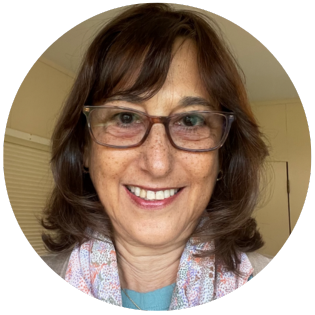
Deborah Silver
Director, Health Consortium of Greater San Gabriel Valley
“The Health Consortium of Greater San Gabriel Valley depends on the close collaboration of its participants to succeed, and also on the support we get from Heluna Health, which has provided us with contracting, administrative, and other support for nearly 10 years. Heluna Health has expanded its work with us recently, helping us apply for funding, and we greatly appreciate its partnership.”
Thank you to the numerous individuals, foundations, corporations, and government agencies whose critical support enables Heluna Health and our partners to build healthy, strong communities for all. Gifts, grants, and contracts of $1,000 or more for the time period July 1, 2022 – June 30, 2023 are recognized in the Impact Report.
- Acme Bread
- Alameda County
- American Heart Association
- Angeles Community Health Center
- Anonymous (6)
- Anthem Blue Cross
- Arcora Foundation
- Arthur J. Gallagher & Co.
- Association Of Public Health Laboratories
- Association of States and Territorial Health Officials
- Azusa Pacific University
- Alexander Baker
- Black to the Future
- Blue Shield of California Foundation
- California Community Foundation
- California Department of Developmental Services
- California Department of Education
- California Department of Public Health
- California Family Resource Association
- California HIV/AIDS Research Program
- California Primary Care Association
- California Thoroughbred Horsemen’s Foundation
- Camber Collective
- Care Transformation Collaborative Rhode Island
- CareQuest
- CDC Foundation
- Centene Management
- Child360
- Children’s Hospital Los Angeles
- Chinatown Service Center
- Cicatelli Associates, Inc
- City and County of San Francisco
- Office of Contract Administration Purchasing Division
- San Francisco Department of Homelessness and Supportive Housing
- San Francisco Department of Public Health
- City of Hope
- City of La Puente
- City of Long Beach
- City of Los Angeles
- CM School Supply
- Columbia University
- Community Health Councils
- Corixa Corporation
- County of Contra Costa
- County of Imperial
- County of Los Angeles
- County of Marin Special Education Local Plan Area (SELPA)
- County of Orange
- Crankstart
- Mr. and Mrs. Kevin L. Curtis
- Blayne Cutler and Family
- Cypress Faith Foundation
- East Valley Community Health Center
- Eastern Los Angeles Regional Center
- Economic Security Project
- Carladenise Edwards
- El Nido Family Centers
- El Proyecto del Barrio, Inc.
- Emanate Health
- Entertainment Industry Foundation
- Every Mother Counts
- Family Health International
- First 5 Los Angeles
- First 5 Orange County
- Flora Family Foundation
- Florida State University
- Fred Hutchinson Cancer Center
- Morris Friedell
- GARDP Foundation
- Garfield Health Center
- Genentech
- George Kaiser Family Foundation
- Gilead Sciences, Inc.
- Google, Inc.
- Celina Gorre
- Harm Reduction Coalition
- Health Officers Association of California
- HealthConnect One
- Hellman Foundation
- Herald Christian Health Center
- How Women Lead
- Huntington Hospital
- ICON Government and Public Health Solutions, Inc. (CRO)
- Institute for Healthcare Improvement
- Jack & Jill of America, Orange County Chapter
- Japanese Community Youth Council
- Robert Jenks
- Ciara Johnson
- Tamara Joseph
- Joseph & Vera Long Foundation
- JSI
- Kaiser Foundation Hospitals
- Kaiser Permanente
- LA Care
- Lakeshore Learning Materials
- Little Owl Foundation
- Local Initiative Support Corporation (LISC)
- Long Beach Rotary Charitable Foundation
- Los Angeles LGBT Center
- Nicole J. Macarchuk
- MacArthur Foundation
- Hope Tarirai Mago
- Jan and Jerry Maize Foundation
- Zea Malawa
- March of Dimes
- Helen McEvoy
- Meals on Wheels Contra Costa
- Medical University of South Carolina
- Merck Sharp & Dohme Corp.
- Bonnie Midura
- National Association of County & City Health Officials (NACCHO)
- National Association of School Nurses
- National Council of Jewish Women
- National Park Service
- Von Nguyen
- NO/AIDS Task Force dba Crescent Care
- Michael Nuttall
- Jean C. O’Connor
- Office of National Coordinator for HIT
- Orange County Health Care Agency
- Oregon Health & Science University
- Patient-Centered Outcomes Research Institute
- Perigee Fund
- Pfizer
- Pomona Community Health Center
- Pomona Valley Hospital Medical Center
- Public Health Institute
- Rancho Santiago Community College
- RAND Corporation
- Regents of the University of California
- Regents of the University of California-Irvine
- Regents of the University of California-Los Angeles
- Regents of the University of California-San Francisco
- Rhode Island Department of Health
- Sarah and Jimmy Rich
- Richard Heath & Associates, Inc.
- Robert Wood Johnson Foundation
- Robin Hood Foundation
- Elizabeth Power Robison
- Rockefeller Foundation
- RTI International
- Somava Saha
- San Francisco AIDS Foundation
- San Francisco Foundation
- San Francisco General Hospital Foundation
- San Francisco Public Health Foundation
- San José State
- Sheff Sherman Family Charitable Fund
- Sierra Health Foundation
- Skyline Foundation
- State of California
- The California Endowment
- The Council of State Governments Ltd
- The David and Lucile Packard Foundation
- The Earl B. and Loraine H. Miller Foundation
- The Nonprofit Partnership
- The Pearkes Family Fund
- The Ralph M. Parsons Foundation
- The Rudolph J. and Daphne A. Munzer Foundation
- The Schmidt Family Foundation
- The State of Illinois, Department of Public Health
- The University of North Carolina
- Tides Center
- Tipping Point
- Trustees of Tufts College
- Tulsa County
- UniHealth Foundation
- United Healthcare
- United Way of Greater Los Angeles
- University of Kansas
- University of Miami
- University of Southern California
- USC Arcadia Hospital
- University of Texas Southwestern Medical Center
- U.S. Department of Agriculture
- USDA – Food and Nutrition Service
- U.S. Department of Education
- U.S. Department of Health and Human Services
- USDHHS – Administration for Children & Families
- USDHHS – Administration for Community Living
- USDHHS – Centers for Disease Control and Prevention
- USDHHS – Centers for Medicare & Medicaid Services
- USDHHS – Food and Drug Administration
- USDHHS – Health Resources and Services Administration
- USDHHS – National Institutes of Health
- USDHHS – Substance Abuse and Mental Health Services Administration
- U.S. Department of Housing and Urban Development
- U.S. Department of the Interior
- U.S. Department of the Treasury
- Sara Van Acker and Adam Weiss
- Vivian Vasallo
- Santosh Vetticaden
- ViiV Healthcare
- Violet World Foundation
- Walter and Elise Haas Fund
- Watt Family Trust
- Westat
- Edward Yip
- Youth Community Developers
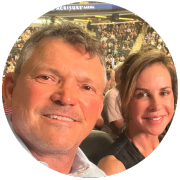
Jan and Jerry Maize
The Maize Lasker Group
Morgan Stanley Wealth Management
“As investment advisors, we’ve worked with Heluna Health for nearly 10 years, and over that time, we’ve learned about how it has helped vulnerable people in communities across California and beyond, which has inspired us to support the organization through our philanthropy. Our contributions to Heluna Health are an investment in the future and in giving all people the opportunity to lead healthy lives.”
Heluna Health’s accomplished Board of Directors and experienced executives work collaboratively to support our partners and direct programs, and to improve health outcomes in our communities.
Board of Directors
Officers
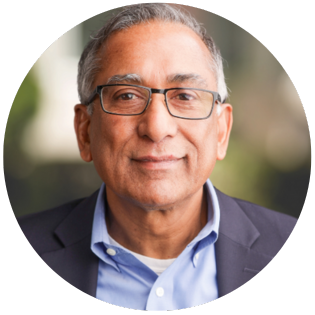
Santosh Vetticaden, MD, PhD, MBA
Chair
Biotech Entrepreneur/
Co-founder, Visgenx Inc.
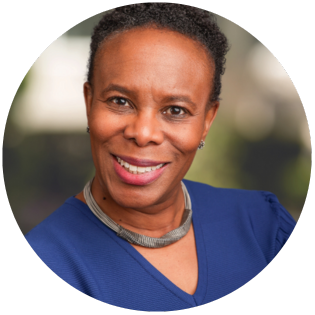
Carladenise Edwards, PhD
Vice Chair
Chief Administrative Officer, Miami-Dade County
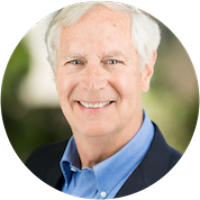
Robert R. Jenks, MBA
Treasurer
Managing Director,
Redbrook Partners LLC
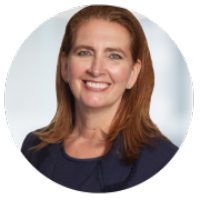
Nicole J. Macarchuk, JD
Secretary
Partner, Dechert, LLP
Directors
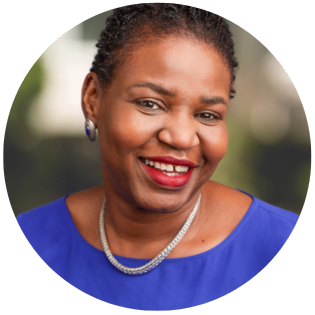
Nwando Anyaoku, MD, MPH, MBA
GVP, Chief Health Equity and Clinical Innovation Officer, Providence
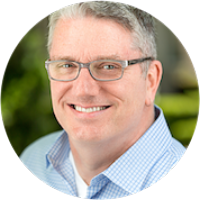
Alexander Baker, MBA
Consultant
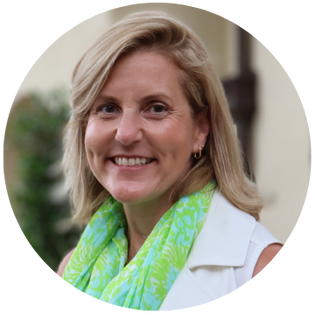
Jennifer Covich Bordenick, MHRD
Chief Executive Officer, Executives for Health Innovation
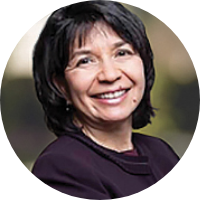
Terhilda Garrido, MPH
Executive Director, Sustainability and Impact Finance, UC Berkeley, Haas School of Business
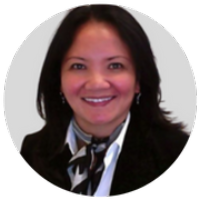
Celina Gorre, MPH, MA
CEO, WomenHeart
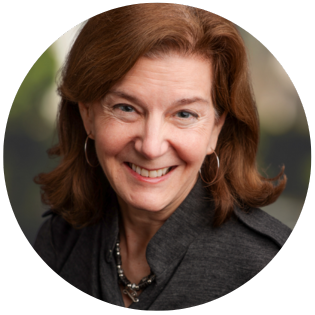
Tamara Joseph, JD
Chief Legal Officer, Spero Therapeutics
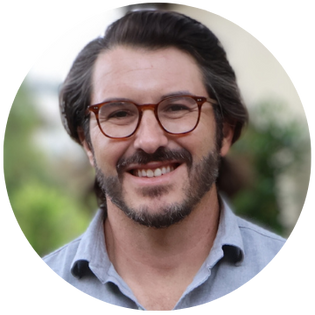
Alessandro Lazzarini
Investment Analyst, Capital Group
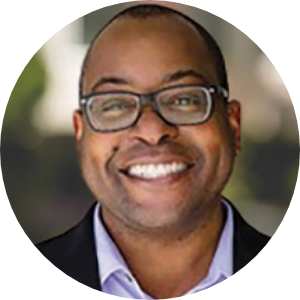
Hope Tarirai Mago, MBA
Partner, HCAP Partners
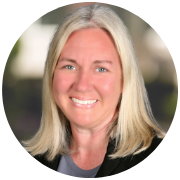
Bonnie Midura, MPH
Senior Program Manager,
The California Endowment

Jean C. O’Connor, JD, MPH, DrPH, FACHE
Managing Principal,
Health Management Associates
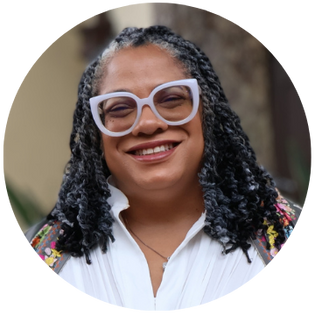
Virginia Pryor, MSW
Chief Strategy Officer, Covenant House International
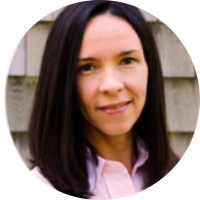
Sarah Mullen Rich, MBA
Consultant, Healthcare Finance
Executive Management Team
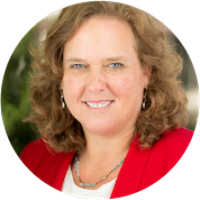
Blayne Cutler, MD, PhD
President and Chief
Executive Officer
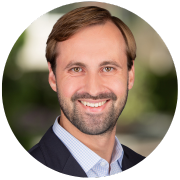
Jordan Gadd, MA
Chief of Staff
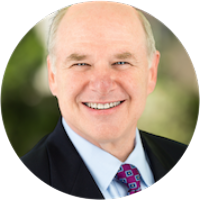
Brian Gieseler, MBA
Chief Financial Officer
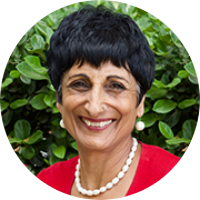
Kiran Saluja, MPH, RDN
Executive Director,
PHFE WIC Program
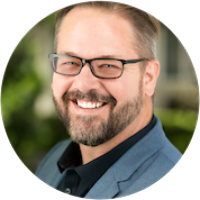
Peter Dale, CPCM, MA
Chief Program Officer

Jo Kay Ghosh, PhD
Director of Research
and Evaluation
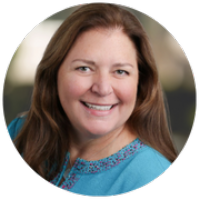
Elizabeth Power Robison, MBA
Chief Advancement Officer
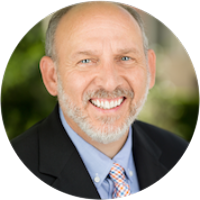
Tim Seifert, JD
Chief Human Resources Officer
Presenting Heluna Health’s 2023 Outstanding Achievement Awardees
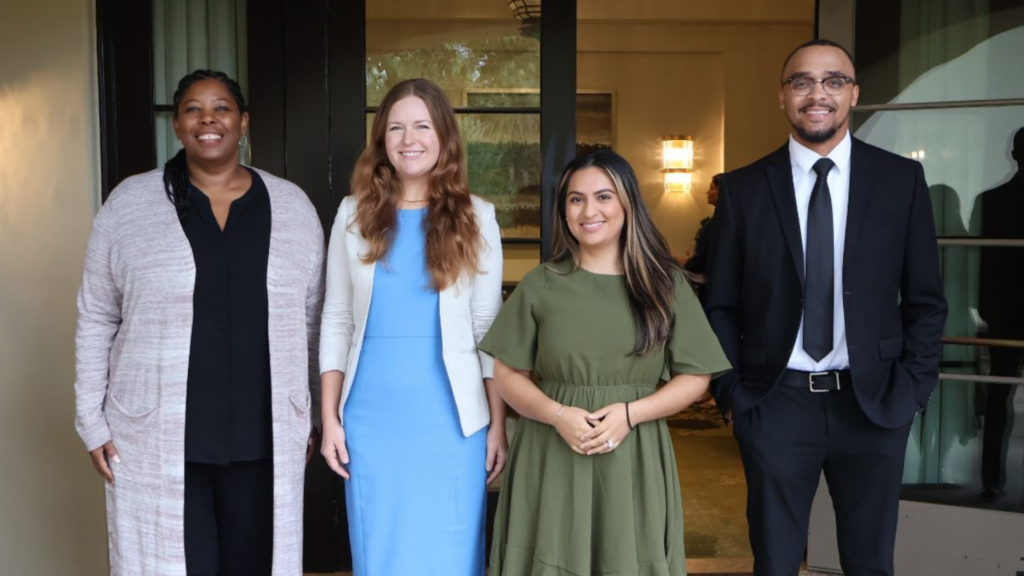
In 2022, the Board of Directors of Heluna Health began honoring staff for their work by awarding annual Outstanding Achievement Awards. In 2023, two staff members and one project team received the award for advancing population health.
Financials
In fiscal year 2022–2023, the COVID-19 pandemic tapered, thankfully. As expected, Heluna Health’s revenues and expenses related to COVID-19 decreased too. Total fiscal year 2023 support and revenues were still well above historic, pre-pandemic levels. Total fiscal year 2023 support and revenues reached more than $876 million while total expenses were just under $875 million. In addition, Heluna Health’s total net assets grew to $20.7 million, up from $19.2 million the prior year, an increase of 7.5%, resulting from disciplined fiscal management.
Heluna Health’s audited financial statements for the year ending June 30, 2023, are available here.
Statements of Financial Position
June 30, 2023 and 2022

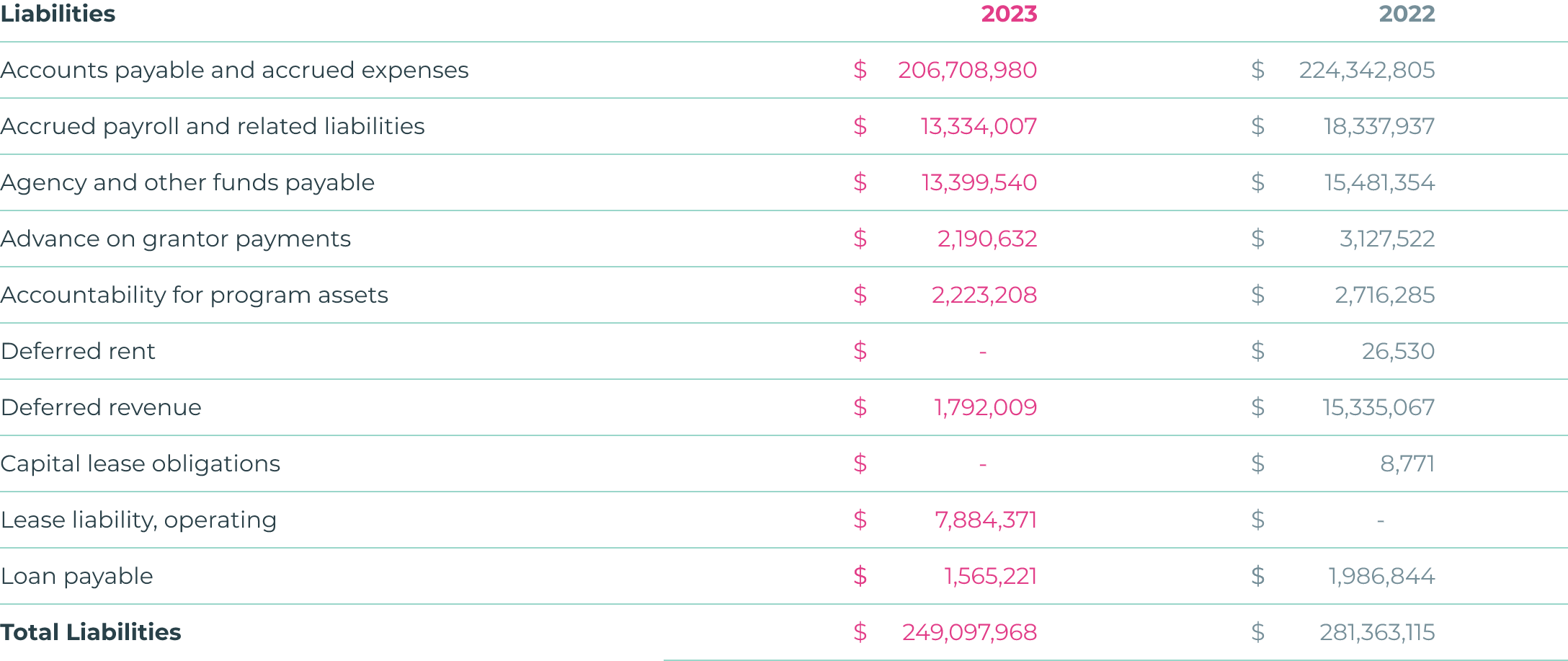


Statement of Functional Expenses
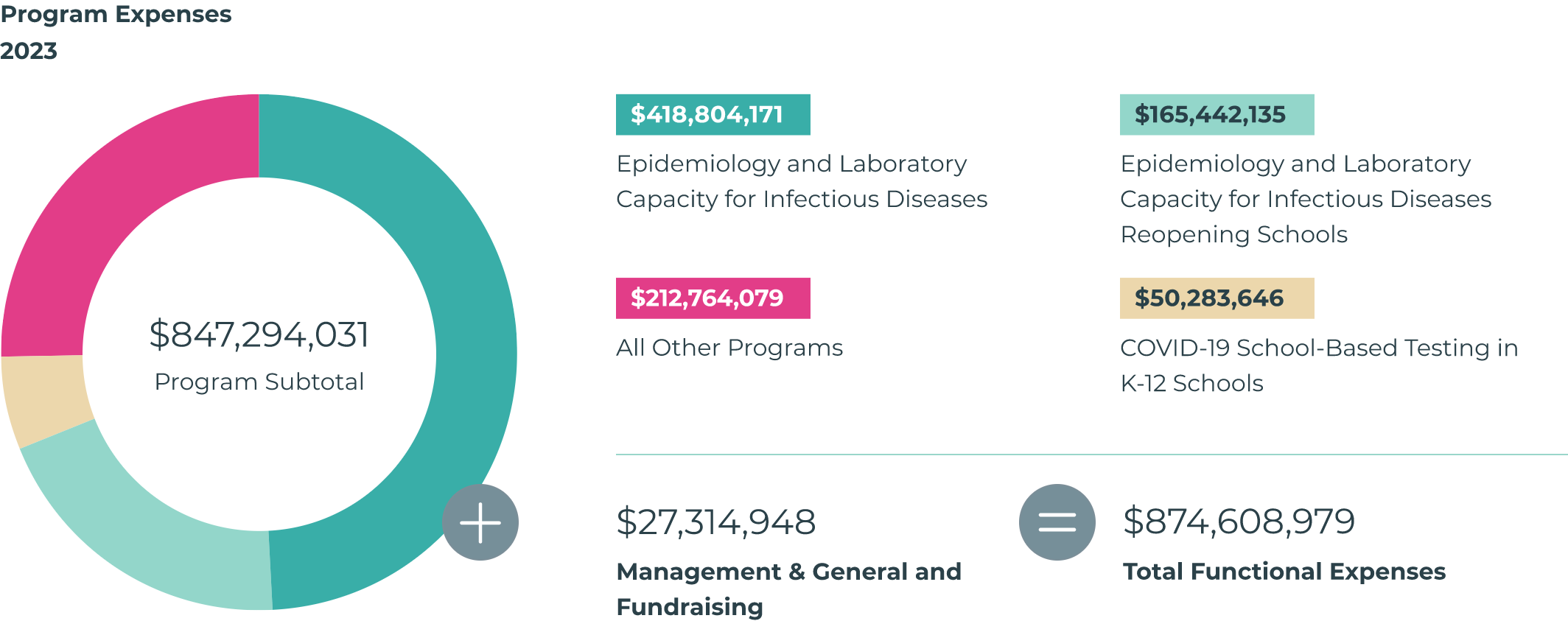

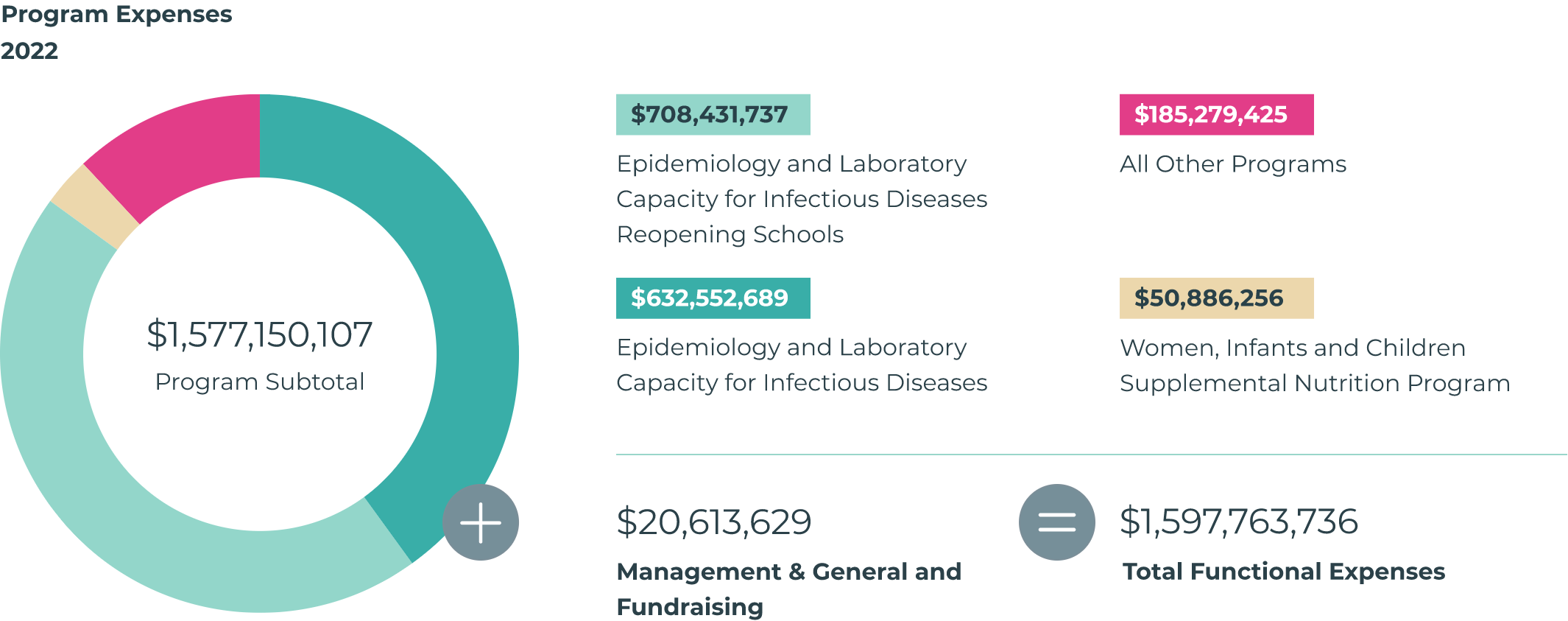

Statements of Financial Position
June 30, 2023 and 2022
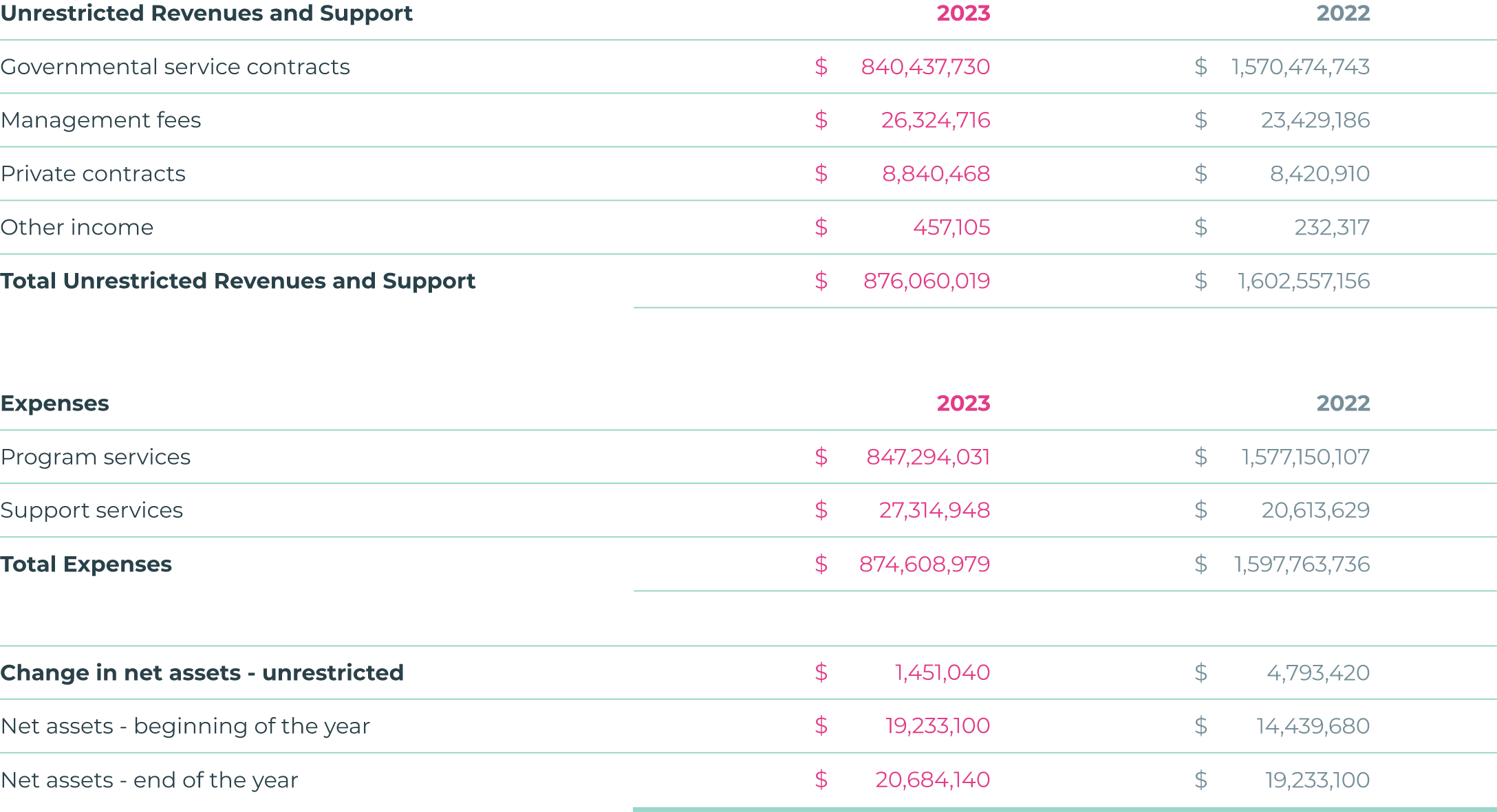

Connect
The people who work for Heluna Health and the programs that we partner with dream big. We envision a world in which the zip code you live in does not determine your health or your lifespan. Our long-term goal is health equity and healthy, strong communities for all. Our daily goal is helping the people we serve take another step forward on their health journeys.
Collectively, our wide range of programs help people in many ways. Among numerous programs, we find shelter for the unhoused; care for those afflicted with drug addictions; counsel expecting mothers on achieving safe and healthy births; conduct innovative research in the fight against HIV; develop tools to help communities prepare for health emergencies; prepare children under age five for success in school through an early literacy program; create courses for future community health workers; and provide nutrition counseling for individuals with health disorders and diseases.
While Heluna Health and our partners conduct work in many different areas of population health, we are united by a vision of a world in which everyone can lead a healthy life.
Our continued success depends on strong connections with our partner organizations and on the involvement of individuals, foundations, and corporations that recognize the value of our work. We appreciate the contributions of all of our collaborators and friends. For those who are just discovering Heluna Health, we invite you to learn more about us and join our community.
Heluna Health
Community Fund
Supporting Community Health Workers
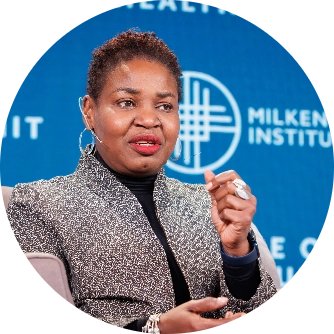
Nwando Anyaoku, MD, MPH, MBA
Member, Heluna Health Board of Directors
GVP, Chief Health Equity and Clinical Innovation Officer, Providence
Much of the power of community health workers comes from their lived experience. They typically come from the communities that they serve, so they deeply understand the issues faced by their clients. For low-income individuals and families who face health inequities, community health workers provide culturally congruent information, guidance, connections, and other support that help them achieve positive health outcomes.
Heluna Health and our partner programs employ scores of community health workers, from nutritionists and lactation consultants to outreach workers, doulas, and others. While there is a great need for more of these frontline workers, there is a lack of standardized training. In 2023, Heluna Health launched Skill Builders, a series of accessible online courses that provide valuable community outreach and training skills. Courses focus on key competencies of community health workers, including care coordination, communication skills, and more.
According to Dr. Nwando Anyaoku, Heluna Health Board member and Global Vice President and Chief Health Equity and Clinical Innovation Officer of Providence, the goal is to close the empathy gap between providers and patients from underserved communities. “Community health workers offer that opportunity. They understand patients, their needs, the cultural context, and their language, and bridge that gap so we can work to a more equitable health system.”
Dr. Anyaoku made these comments at the Milken Institute Future of Health Summit, held in Washington, DC in November 2023, when she participated on a panel focused on investing in community health workers. “We have to give them a path for professional development, and that’s what Heluna Health has started to do by building a training curriculum for community health workers,” she said.
The Heluna Health Community Fund provides essential support to help grow the community health workforce. It also supports evidence-based health interventions and more equitable access to maternal care and nutrition services, the expansion of disease prevention, and more. You can join Heluna Health’s efforts to bridge the empathy gap through a donation to the Heluna Health Community Fund.

Nwando Anyaoku, MD, MPH, MBA
Member, Heluna Health Board of Directors
GVP, Chief Health Equity and Clinical Innovation Officer, Providence


